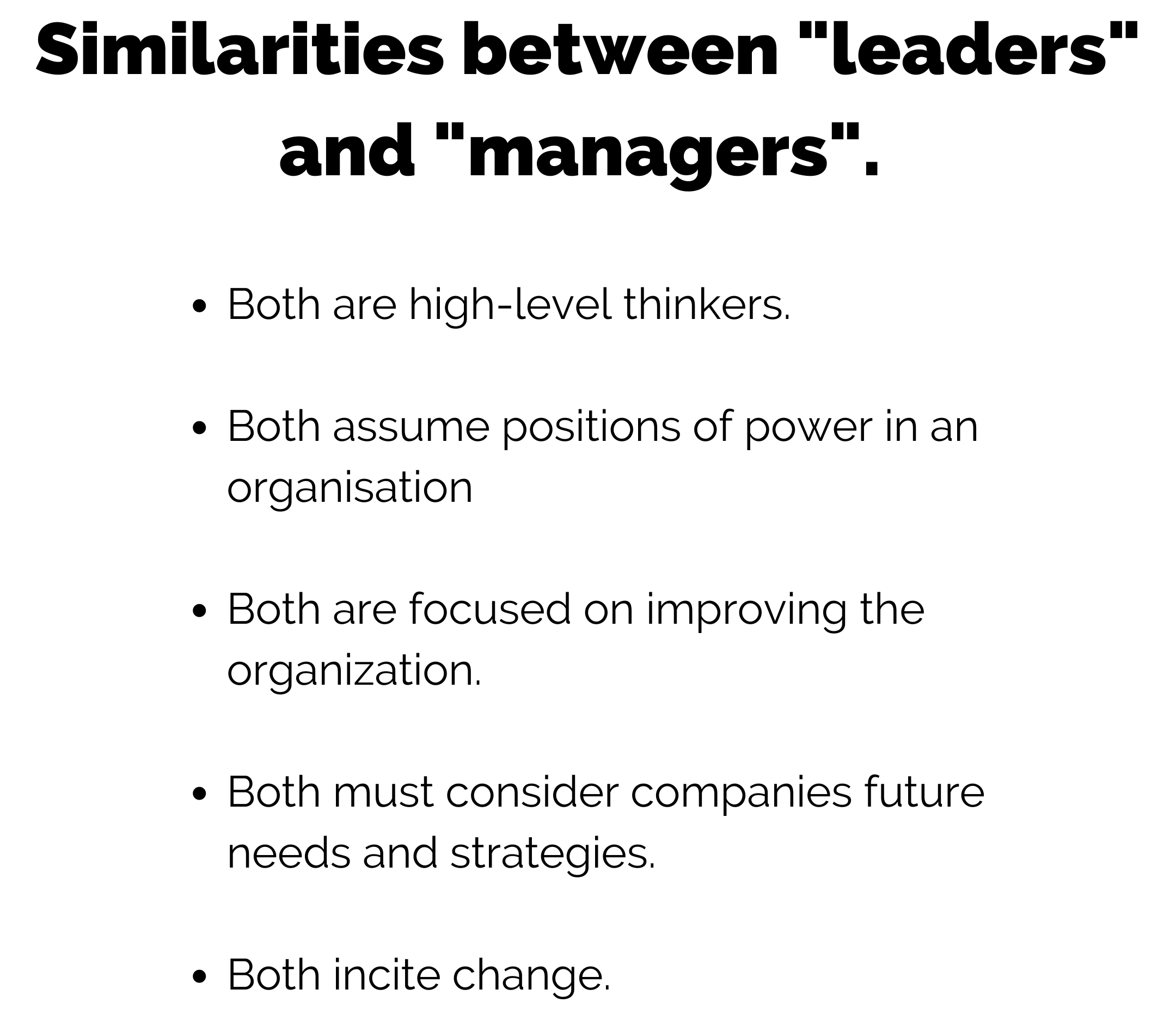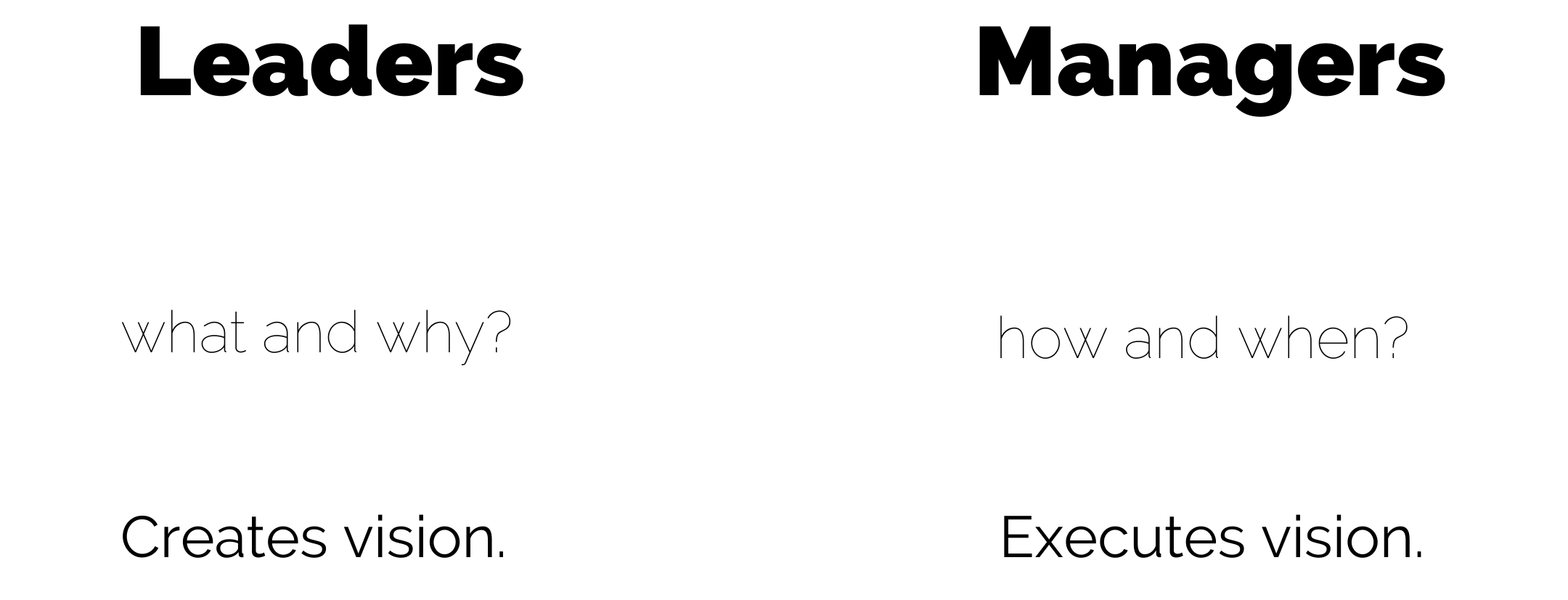
What is the difference between a leader and a manager?
Leaders, managers.
Both are distinct roles, rightfully necessary in the successful function of any business, but do you know the difference?
Because of some essential similarities we often see the terms used interchangeably and confused.
In this article I tackle their respective definitions, outlining their key differences and offering a new framework to categorise and understand them.
But before all that, let us consider their similarities.
- Both are high-level thinkers.
- Both assume positions of power in an organisation.
- Both are focused on improving the organization.
- Both must consider companies future needs and strategies.
- Both incite change.

One quick scan of the above and it’s easy to understand where the uncertainty can stem, certainly in my own research I found myself inundated with articles that probed the very same question.
How to settle it once and for all? To ask less “what”, so we can move onto the “why?”
A definition of each to start:
Definitions:

Leader:
Creates vision.
A leader doesn’t typically hold or occupy a certain position, as a term it is fluid and flexible which at time can make it difficult to define. A leader’s role is most crucial in the initial inception of ideas; they are usually the necessary force that may drive a business into fruition. Leaders typically identify with positions and qualities that cannot be quantified or measured but are deeply felt.
Leaders assert power and incite action in their own unique way, without the need for titles or agenda. They inspire, motivate, and innovate.
Put simply: leaders are concerned with the larger scope of business; what and why?
Powerful, innovative, creative, but useless, without a plan.
We cannot refute a leader has unequivocal value and influence over a business, they leader cannot function in isolation. No, they need someone to impose order, structure, and delegate tasks. …
Enter, the manager.
Manager:
executes vision.
Managers are concerned with the quantifiable aspects; the how and when?
In contrast to a leader, a manager is operational in nature, relying on measurable tactics to bring a leader’s big picture idea into fruition. Whilst leaders exist to create or incite change, managers exist to establish order and create the process.
They apply structure to large-scoped goals that may seem out of reach. Stemming from this, they work diligently to monitor and ensure tasks are met and fulfilled.
Unlike leaders which are orientated to a higher level or purpose; functioning in the flitty realm of intangible, a manager’s role is more clearly defined, task orientated and involved in the day-to-day.
We see them engaging in tasks such as:
- Setting timelines for goals and strategies.
- Upholding the structure of the organization.
- Budgeting and planning.
- Establishing policies and procedures.
- Recruiting and employee management.
Make sense?
It should.
As a topic, this really shouldn’t be too complex, but see, we have a certain proclivity to over- complicate. In my own research, I found the sheer number of articles tackling this question to be startling, almost shocking. Thousands of articles are nearly unanimous in their agreement of the roles and function, but in their attempt to incite a response or create meaning, flitted off in their own tangential directions.
Some articles did this in guised ways, equating roles with certain personality types and human characteristics.
We see leaders as:
- Creative
- Innovative
- Charismatic
- Artistic
We see managers as
- Organised
- Obedient
- Ordered
- Conservative
Others were more aggressive, less cryptic in their approach, promoting binary-like thinking with dangerously reductive titles like
- “How to be less of a manager, more of a leader.”
- “Leaders vs. Managers”
- “Why we need more leaders, less managers.”
The result?
Leaders are given the shining glory, thrusted out onto stage to reap the applause whilst managers (deemed the less-sexy counterpart) are shirked to the shadows, banished to fiddle with stage and set pieces, and watch from behind the curtain.
It can be tempting to create assumptions or offer your own judgement, to make complex issues easier to understand by endowing them with personalities traits or human qualities. But characteristics or inclinations don’t necessarily translate so easily in this way. In such a vast and complex the value of certain roles cannot be vetted against each other.
Dangers in Comparison
It can seem harmless, almost intuitive to ask to these questions. Once differences and definitions are established, it can be easy in our attempt to create something of meaning, to make a judgment or summarise with an assumptive clause. We always seek to see the difference, to make a judgment or find an answer, but don’t care to ask beyond. Roles and individuals are kept safe, ossified, and stifled in in their allocated taxonomies and office cubicles. But this does little for progression or the cultivation of new ideas.
Asking questions like “what is the difference?” are reductive and outdated, they promote binary- thinking and can further regiment taxonomies.
So, why am I here, tackling the very same question that we agonize and probe over? And why do others continue to even though it seems a consensus has been reached?
Whilst the abundance of articles and varying responses may suggest to some a certain pertinence to the topic, I think it contrastingly points to a confusion.
Rather than surreptitiously slip into the mass of other articles using a simplistic question as a clever guise to perpetuate my own twisted polemic, ¾ way into this article, I propose to change the question.
I suggest we ask.
Is there a difference?
Are we asking the right questions?
I realised the abundance of this question points less to a pertinence but more a sort of disjunct between the questions we ask and the answers we seek, signalling the need for a shift in conversation. We need reconsider the manner we approach topics and the way we understand our corporate sphere. We need new narratives, new conversations; a reconstruction in the structure by which we converse.
Rather than regarding them as two terms with differences, we should begin to see them as existing symbiotically, inextricably looped and forever reliant on the other.
Hybridisation
Our sphere is constantly changing, evolving, flexing. Old methods of working are being replaced for newer, more hybrid approaches. Roles are being shattered, redefined, or fused. We are experiencing a seismic shift in the way we approach, operate, and understand business.
I suggest this warrants a hybrid lexicon:
So, what next?
How does one evolve once understanding has been reached?
Some tips to extend the conversation:
In the terms of “managers” and “leaders”:
- Recognise the similarities between “leaders” and “managers”.
- Consider how both might become more like the other?
- Consider how you might integrate the two?
- Consider how you can allow greater collaboration between these roles in your own workplace? Implement tactics.
- Ask individuals in your organisation to define their own roles?
- Consider new questions on pertinent topics.
- Can you find new terms to use?
Beyond this:
- Resist the instinctual urge to view things as clearly delineated, see them operating tandemly.
- Recognise distinction does not mean
- Delve beyond the difference
- Ask more “why” less “what?”
- Challenge roles by integration, not by comparison.
